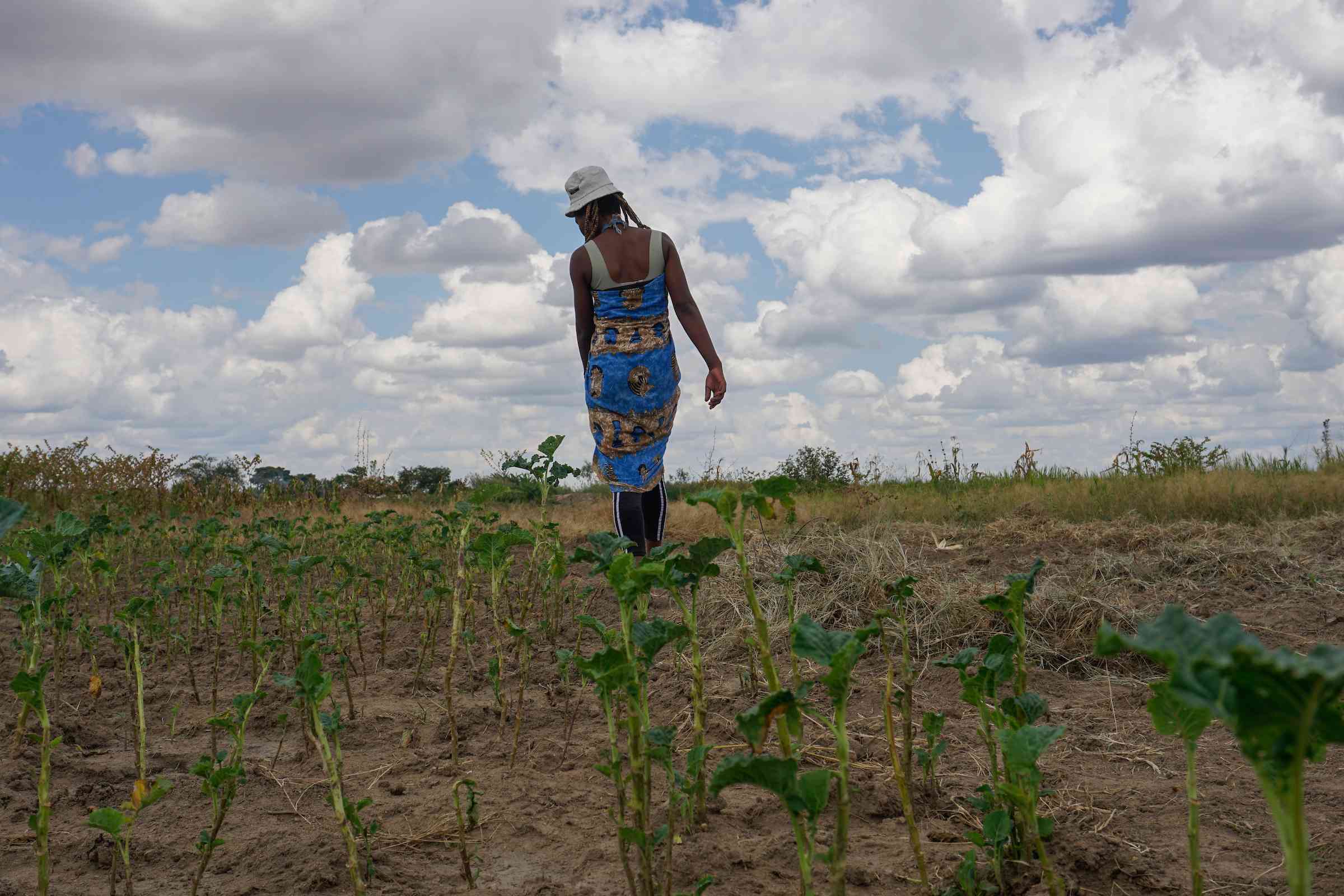
What started off as mischief grew into a few months of crime that landed Miriam Nyakatsari a two-year prison term for theft and unlawful entry.
Nyakatsari says her life was a mess in 2020.
“I had walked out of an abusive marriage. My husband was a drug addict and I ended up also taking drugs. I started living alone and befriended two guys whom I later committed the crime with. The drugs made me do the unthinkable,” she says.
Though she was not physically at the crime scene, Nyakatsari’s previous dalliances with crime caught up with her. When her accomplices were arrested during a home break-in, they reported her as one of their partners, though she says she had only been their accomplice a few times.
Nyakatsari says reality started to sink in when she stepped into Chikurubi Maximum Prison. That is when the mother of five realized her life would never be the same again.
“No one visited me for the year that I spent at Chikurubi Maximum Prison. I was all alone. My family neglected me. It was hard,” she says.
She says it was only when she was transferred to Marondera Female Open Prison — after being deemed trustworthy and hardworking — that the frosty relationship with her family began to thaw.
The Zimbabwean government in 2021 opened Marondera, its first open prison for women, giving a chance for qualified prisoners to spend time with their families while serving their sentences. The objective is to make it easier for the women to reintegrate into their communities upon their release.
- Zim fails US fiscal test
- Medical aid societies defend service charges
- Mystery buyer of diamonds outed
- Is the juice worth the squeeze?
Keep Reading
Following a presidential amnesty in May, more than 4,000 prisoners in the country were released. The female open prison was left with only two offenders up until early September when 23 prisoners were taken in. Nyakatsari was part of the first group admitted to Marondera and was among the first offenders released from the prison.
History of open prisons
An open prison is one where offenders serve their sentence with minimum supervision and have freedoms and privileges that the closed prison does not offer. These include having a self-contained room, cooking their own meals, being allowed into town without escort and unsupervised home visits.
The concept of open prisons dates back to 1891 in Switzerland, but the idea didn't really take off until the 1930s and 1940s when the United Kingdom and the United States, respectively, established their own open prisons. The concept then slowly spread around the world.
Also called minimum security prisons, the idea is that the offender is sent to prison as punishment, not for punishment. Open prisons are also based on the belief that offenders cannot be prepared for freedom unless the conditions of captivity are relaxed, creating a bridge to society upon their release.
Zimbabwe’s experience with open prisons
In Africa, Zimbabwe’s Marondera Female Open Prison is the second to open, following one in Mauritius that opened in 2015.
Marondera housed about 35 women when it opened in 2021 and has capacity for 50. It is the second open prison in Zimbabwe after Connemara, an open prison for men, established in 1997. From 2012 to 2019, the number of men held in the Connemara prison fluctuated from a high of 84, in 2014, to a low of 29, in 2019, according to a 2019 government report.
Open prisons for men are more common on the continent. For example, Zimbabwe’s eastern neighbor Mozambique had 40 open prisons for men by 2001, according to the 2008 book “Human Rights in African Prisons.”
People held at open prisons must be serving sentences of at least 12 months and have served at least two months already in a closed prison, says Chief Superintendent Meya Khanyenzi, of Zimbabwe Prisons and Correctional Services. People convicted of serious offenses, such as rape, murder and kidnapping, are not eligible.
Offenders at an open prison are entitled to five days home leave a month. During this time, they are allowed to visit their families without an escort while still serving their sentence. These visits serve as a way to keep families connected, making reintegration easier.
Khanyenzi says there is need for society to fully appreciate the concept of open prison so that offenders are not labelled “escapees” when they are sent on home leave.
Relationships with family improve
Nyakatsari says her relationship with her family improved once she moved to the open prison.
“I started communicating with my sister, I asked for forgiveness, and she also pleaded with Mum on my behalf. Through the efforts from the prison’s rehabilitation program my mum finally came through to visit. It took a series of calls for her to forgive me and accept the invite by the prison.”
Her first home visit, though, came as a shock.
“The first day I came, people were surprised and in awe. I had appeared on a TV program called ‘Behind Bars.’ People questioned why I was out when I had not completed my sentence,” says Nyakatsari.
Her 16-year-old daughter, Leona Chipasuka, cried and fainted when she first saw her.
“I wasn’t aware she was coming, and I was shocked but happy at the same time,” says Chipasuka. “The visits helped me because we could connect during the time she came back home.”
Nyakatsari’s sister, Caroline Nyakatsari, whom she now lives with, had fears during the initial home leave.
“When she first came back for the five-day visit, we were afraid she would commit crimes again and we had to keep a close eye on her,” says Caroline Nyakatsari. “I think the rehabilitation helped because there were no problems we encountered with her during the visits.”
Successes of open prisons
According to “Human Rights in African Prisons,” Mozambique has had a successful open prison program. People released from its Mabelane Penitentiary Prison rarely commit crimes again. Some have even settled in communities close to the prison after release.
In Zimbabwe, Khanyenzi says that in addition to the open prison concept, there are other initiatives aimed at rehabilitation, including engaging chiefs in areas where offenders committed a crime to seek forgiveness on their behalf.
“We are also pursuing rehabilitation through the gospel, where we go to churches and encourage people to forgive former offenders," Khanyenzi says.
As part of rehabilitation, offenders also undergo skills training while in prison.
“Inmates at an open prison are taught self-help programs that are meant to generate income to sustain themselves and their families,” says Khanyenzi.
Struggle to fit in
Nyakatsari’s stay in prison gave her time to reflect on the person she had become. It offered her a chance to open a new chapter in her life. But the stigma she faces sometimes hampers her progress.
“It is always hard to come back to a place where you would have committed a crime. No one trusts you. Even at a gathering, when you leave, people check if their wallets are still intact,” she says, as tears well in her eyes.
Although her family accepted her, Nyakatsari says trust was lost and even neighbors were skeptical of having her around.
There were times after her release when she felt it would be better to commit a crime and be sent back to prison rather than face the daily stigma.
Edina Takuza, a neighbor, admits she and others had fears Nyakatsari might be monitoring their movements and break into their houses at night or coordinate with other thieves.
“Some people in the community call her names like ‘Chejeri,’ meaning a person from jail. It took time for me to accept her, but with time I realized that she had reformed,” says Takuza.
Nyakatsari says she is comforted by her sister’s encouragement to ignore what people do or say sometimes.
Stigma after imprisonment
For people who have served time in prison, rejection by society affects their sense of security and ability to reintegrate, according to a 2019 government report.
“Shaming and name-calling affects a person when they return to society,” says Edison Chiota, CEO of the Zimbabwe Association for Crime Prevention and Rehabilitation of the Offender, a nongovernmental organization that works with people after they leave prison. “This makes people shy away from talking about having been in prison because they will be treated as outcasts.”
Chiota says stigma has forced many people upon their release to move to a place where no one knows them.
“Some even lie that, during the time they were incarcerated, they had moved to South Africa,” says Chiota.
This is true in the case of Rhoda, who chose to use only her first name for fear of stigma. She was sentenced to two years on charges of theft and served one year and two months at the female open prison.
After her arrest, her husband moved them to a new neighborhood because of what had happened.
Rhoda now lives in a community where people do not know her past. She operates a vegetable stall in her new neighborhood. She feels her life is back on track.
“I think if people in the neighborhood I live in knew of my past, things would have been different. I would not have been treated in the same way they do now,” she says.
The future of open prisons
When inmates visit their families during their time at the open prison, the Zimbabwe Prisons and Correctional Services monitors progress.
Budget constraints, however, mean that these visits and follow-ups rarely happen once a person is released.
“Through monitoring, ZPCS gets to gather information of how the person was faring during the visits with their families and community at large. If that is rectified, it will help ensure that people even in communities are involved in the rehabilitation process,” says Chiota.
The Marondera Female Open Prison is expected to expand to accommodate about 400 women, according to a 2021 report from TelOne, a telecommunications provider in Zimbabwe that supported the construction of a clinic at the prison.
Zimbabwe Prisons and Correctional Services aims to have an open prison in each of the country’s ten provinces so that prisoners can be closer to their families and neighborhoods, says Khanyenzi.
The government has, however, acknowledged it has limited resources to scale up the open prison system.
Life after prison
For Nyakatsari, life after prison has its share of challenges. While she took a number of courses while in prison, including agriculture, decor, makeup and management, getting employed remains difficult.
“Anything with a jail tag is hard to use. No one wants to employ you. You are told that ‘we will contact you,’ but you realize that you are segregated and no one really wants to take you,” she says.
Nyakatsari is trying to pursue agriculture with the little knowledge she acquired and is working with her sister who practices horticulture in their neighborhood.
“My plea is to get something to help me to be financially stable and ensure that I do not commit crime again,” says Nyakatsari.
This story was originally published in Global Press Journal.
Global Press Journal is an award-winning international non-profit news publication that employs local women reporters in more than 40 independent news bureaus across Africa, Asia and Latin America.










